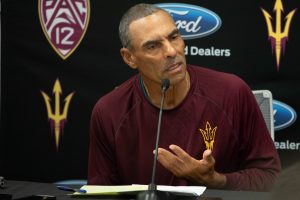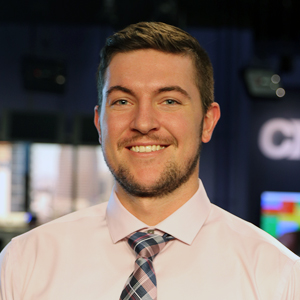PHOENIX – Professor Edwards?
That’s what students in the Walter Cronkite School of Journalism and Mass Communication will be calling Arizona State football coach Herm Edwards in the spring when he begins his teaching gig at the university.
It was announced this summer that Edwards would be joining the faculty as a professor of practice. Little did everyone know this was the plan from the start, said ASU Vice President of Athletics Ray Anderson, a former sports agent and friend for over 25 years.
“When I first had discussions with Herm about coming here, I said, ‘Oh, and by the way there’s a professor of practice opportunity for you at the Walter Cronkite School … because that’s what you have been. So, let’s look at making you a professor of practice, Professor Edwards,’ and he was all on it,” Anderson said.
Most of Edwards’ teaching at Cronkite will come after the football season, primarily as a “contributor,” Cronkite School Dean Chris Callahan said. He will lecture, offer input during symposiums and share real life stories and experiences in classes. A more defined role will follow but for now his appearances will be intermittent.
Edwards is not the first college football coach to instruct in the classroom. Washington State coach Mike Leach taught a five-week non-credited course in the spring alongside Spokane County Treasurer Mike Baumgartner called “Leadership Lessons in Insurgent Warfare and Football Strategies.” And Urban Meyer, after retiring as Ohio State’s coach, taught a course titled “Leadership and Character” in the school’s Fisher College of Business with Lt. Col. Charles Buchanan.
Edwards played football in college and the NFL, then coached for over 20 years. In 2009, after he was fired by the Kansas City Chiefs, he joined ESPN as an analyst and became one of the network’s most popular personalities with his knowledge, humor and passion for the game.
Edwards has been known for phrases like, “Hello? You play to win the game,” and, “Don’t press send” during his coaching and broadcasting careers.

Arizona State coach Herm Edwards often discusses life lessons when in press conferences. (Photo by Justin Parham/Cronkite)
After working in the media for eight years, he was presented with the opportunity to return to coaching in 2017, this time to lead the Sun Devils. It took the right situation to bring him back to the sidelines and out of the studio, Edwards said, and that is exactly what Anderson and ASU President Michael Crow presented.
“They think outside the box,” Edwards said, “and I think that I am a little bit outside the box as well so I think we all just matched. I mean, our ages are similar so we kind of all have that going but I think our mindset of ‘what you want to leave as a legacy here’ is important.”
Anderson and Edwards have known each other for over 25 years. When Edwards landed his first coaching job in the NFL, with the New York Jets in 2001, Anderson was his agent and helped negotiate the deal.
When it came time to find a new coach for the football program in 2017, Anderson knew exactly who to call.
“Dr. Crow is very persuasive,” Anderson said. “He can articulate a vision of doing things differently and innovatively and impactfully like no one else I have ever met so, I knew that for Herman, if I could get him in the audience of Dr. Crow, which I knew I could do, that he too would see and appreciate the vision of doing it differently and that would very well entice him off the set of ESPN to join us here to do it differently.”
After Crow and Anderson secured Edwards to be the head coach and eventually a professor of practice as ASU, they had to run the idea past one more person: Callahan.
“(Anderson) called me and he was about halfway through the idea and I was like, ‘I get it, I love it, let’s do it,'” Callahan said.
Edwards’ experience impressed the dean.
“He has this fantastic background, of course, as a longtime player in the NFL, so he understands the media relations aspect from the player perspective, as a longtime coach for the Jets and the Chiefs and now for the Sun Devils, and then in between, for the better part of 10 years at ESPN at the top level of being on the other side of the microphone, so he has a perspective that very few other people in sports has,” Callahan said.
One thing is for sure when it comes to Edwards’ teaching: He will be joined in the classroom by a plethora of friends he has made in the business over the years.
“There will be some media and TV and broadcast stars showing up on this campus as part of Herm Edwards’ efforts and part of his friendships,” Anderson said.
Edwards said, “We are going to figure out a format and everything else and that will be kind of interesting. Whether I bring in folks along with myself that have worked in television, that would be interesting, too.
“Our good friend (ESPN’s Trey) Wingo, he might be coming in on one of my classes, but we will figure that out. Whatever format that will help these young people become journalists is important.”
